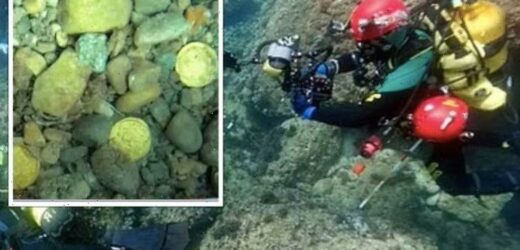Archaeologists 'stunned' at discovery of Roman settlement
We use your sign-up to provide content in ways you’ve consented to and to improve our understanding of you. This may include adverts from us and 3rd parties based on our understanding. You can unsubscribe at any time. More info
The coins are thought to have been hidden from barbarian invaders about 1,500 years ago. They were found by two brothers-in-law who were cleaning rubbish from the seabed in Alicante. The pair unearthed 53 intact gold coins reportedly in “a perfect state of conservation,” after laying untouched since the fourth century.
Luis Lens and Cesar Gimeno came across the spectacular discovery seven metres deep in the sea by the coastal town of Xabia.
Mr Lens told local media: “I thought I had found what looked like a 10 cent coin.
“It was in a small hole, like a bottleneck.”
But when he returned to his boat for further inspection of the artefact, he spotted “an ancient image, like a Greek or Roman face”.
The divers then returned to the site and spent two hours digging up the rest of the treasure using a corkscrew and a Swiss Army knife.


Jaime Molina from the University of Alicante said: “This is one of the largest sets of Roman gold coins found in Spain and Europe.
“It’s an exceptional archaeological and historical find since its investigation can offer a wealth of new information to understand the final phase of the fall of the Western Roman Empire.”
Experts from the University of Alicante have identified three coins that show Roman Emperor Valentinian I, seven coins showing Valentinian II, 15 of Theodosius I, another 17 of Arcadio and 10 of Honorius.”
Honorius, was emperor of the Roman Empire from 393 to 423 AD while Valentinian I is thought to have ruled from 364 to 375 AD.

Mr Molina added: “There are no remains of sunken ships in the area where they were found so it is probably a voluntary concealment from the arrival of the barbarians to the coast of Hispania, in this case, the Alans.
“This finding speaks to us of a context of fear, of a world that is ending, that of the Roman Empire.
“The find illustrates a historical moment of extreme insecurity with the violent arrival in Spain of the barbarian peoples and the definitive end of the Roman Empire in the Iberian peninsula from 409 AD.”
DON’T MISS
EU considers investing in UK’s Galileo replacement [INSIGHT]
Elon Musk ‘interested’ in UK Tesla factory after snubbing Russia [REPORT]
Sturgeon could hold key to ending UK energy crisis [REVEAL]


The coins are set to be donated to a local museum to be put on display.
The bay of Portitxol in Xabia is well-known for having a mass of underwater archaeological remains.
Ceramic remain from different periods, anchors, amphorae cargoes, metallic material and elements used for ancient navigation, have all previously been discovered there.
Source: Read Full Article


